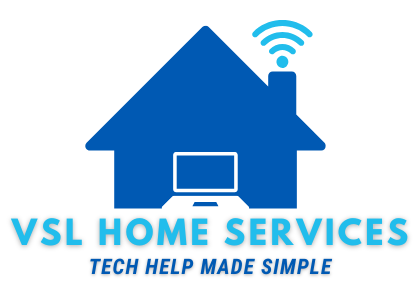
The Covid-19 pandemic created a huge push to work from home (You may learn more in our recent commercial blog at VSL Computers). However, you do not need to be working from home for the need to protect yourself online. Along with the push over 2020 to work from home, we also saw an increase in cyber attacks. We only see the trend continuing as we move forward.
With the increase in cyberattacks, how do you keep yourself protected from would-be hackers? We are covering a few steps you may take to help keep these would-be hackers at bay.
Give your router a unique SSID
Here is a simple step to take, give your router a name. SSID stands for Service Set Identifier, and it is the name of your WiFi network. Many manufacturers of routers have a default router SSID, something along the lines of “LinksysXXXXX.” When you create a name that is unique to you, it is easy to distinguish your network from others in the area. While this does not increase the protection of the network, it does help to keep hackers at bay, and here’s why:
- Default router names may include information that identifies the router make or model, making it easier for hackers to get in.
- It also lets hackers know that your network is more carefully managed than default routers.
Just be sure not to add any personal identifiers to the router name, like a street address.
Smarter Password Use
It seems like we have a password for everything these days, yet, they are a necessity. The passwords we create are our front lines of defense. Trying to manage so many passwords can cause many of us to get lazy and unwise with passwords; using the same password for multiple sites, writing passwords on a sticky note, and more. Here are some security tips when it comes to passwords:
- We touched on using the same password for multiples sites/accounts. Let’s just say, it is not a smart move. We all do it, let’s change it up now.
- Passwords such as Password1 or your kids’ names are not strong passwords, they are easily guessed. Use a strong password, unique to each account.
- Do not share your passwords with others.
- Use a password manager, making managing your strong passwords an easier task.
- Change any default passwords. Many devices that connect to your network, IoT (Internet of Things), and smart home devices often come preloaded with default passwords. Be sure to change them.
Education and Awareness
Many cyberattacks can be thwarted with education and awareness. Phishing emails are legitimate-looking company emails with the purpose of stealing your information. Phishing emails lure you into clicking a link and entering your information on websites that often look like legitimate company websites. They try to get you to enter your login credentials, personal information, or financial details. Things to keep in mind:
- If you are not expecting an email from the company, proceed with caution.
- Use caution when emails are addressed generically, such as “Dear Customer.” Legitimate companies will typically address you by your name.
- Legitimate companies do not request sensitive information over email. More often than not, when you receive an unsolicited email that provides a link and asks for sensitive information, it is a phishing email.
- Legitimate companies use emails attached to their domain. A legitimate company is not going to send you an email from a public email domain. Also, be sure to check the domain name closely as cybercriminals will often use a domain name that looks similar to the legitimate company domain, just slightly misspelled.
- Legitimate companies will not threaten you over email, telling you your account has been restricted or that your services will be suspended.
Educate yourself and be aware of ransomware. What is ransomware? Ransomware is a type of malware that infects your computer and displays messages demanding a fee to restore your system (Read all about Ransomeware in a past blog on VSL Computers).
Safely shop online
We all saw how popular Amazon became. Services like Shipt let you select your groceries online, and once complete, a Shipt employee will shop for you, picking up your groceries and delivering them to you.
Many of us shop online these days, growing even more during the pandemic. How can you keep yourself safe while shopping online?
- Be sure to check that the website is SSL (Secure Sockets Layer) protected and encrypts the data during transfers. You can check this by looking for the padlock icon next to the web address in your browser.
- Never shop while using public WiFi or public computer.
- Use a credit card and not a debit card for increased fraud protection and quicker return of funds.
- When shopping on an online marketplace (like eBay), be sure to check the seller reviews and reputation.
It is also wise to monitor your financial statements to check for any erroneous charges or withdrawals.
About cybersecurity in your home
It is not just businesses and organizations that need to be vigilant when it comes to cybersecurity. You need to remain vigilant at home as well to protect your personal information from cyber attackers. We cannot stress enough the importance to educate yourself and being aware while online and checking emails.
We outlined a few cybersecurity tips above to keep yourself protected at home. What home cybersecurity tips may you share with us and our audience?
